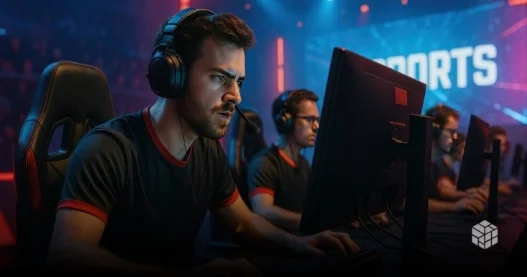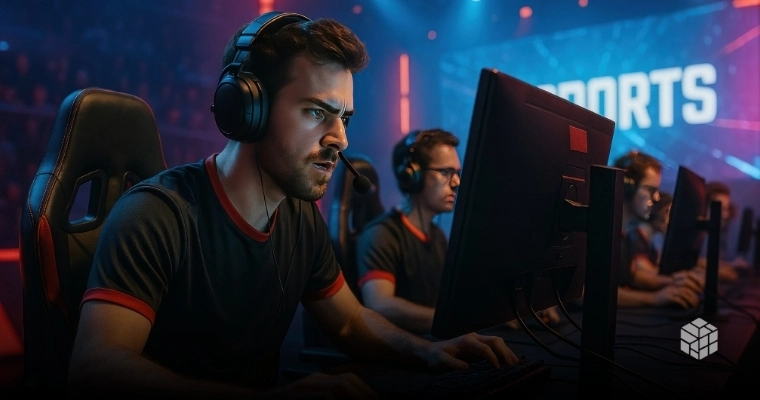The gaming and esports industry continues to become a global powerhouse. But as it happens, new challenges emerge that test its growth, creativity, and stability. Every aspect of the industry is being affected – the esports stars, businesses, the backend, and even fans.
From user challenges to industry-level hurdles, 2026 marks a defining year for how gaming will adapt to its next phase. The industry as a whole has seen a lot of changes over the past few years, and so far, there haven’t been any particular solutions to address these issues.
Key Takeaways
- Financial, technical, and ethical are some of the categories of challenges the esports industry faces today.
- These challenges may continue to roll out in 2026.
- Collaborations from different entities could help solve these issues.
Problem 1 – Financial Sustainability
One of the biggest challenges the video gaming and esports industry currently faces is sustaining the financial capabilities of companies. Studios and teams struggle to stay profitable while maintaining quality and accessibility.
A major factor affecting the financial sustainability of game developers is the continuous rise of development costs for games. High-end graphics, voice acting, and live-service updates demand massive investments, leaving smaller studios struggling to compete. Advanced consoles and gaming PCs are becoming more powerful, but also more expensive. The cost of expanding gaming technology is quite high in today’s market.
To compensate, the developers tend to sustain their finances by using microtransactions as their primary business model for live-service games. But players are growing weary of pay-to-win systems and aggressive monetization that sometimes bypass the online gaming regulations.
Still, developers, mainly those who work on esports titles, find ways to get more funds. Esports tournaments feature high prize pools through brand partnerships and sponsorships and involve professional teams. Struggles on this part emerge, however, because companies invest with the aim of having high ROIs, but some teams don’t always win.
Problem 2 – Workforce Instability
Aside from the financial aspect, the workforce of developers is also being affected by issues, making their instability another issue for the gaming industry.
Employee layoffs and project cancellations are still some of the biggest problems in the gaming industry today. Major publishers have downsized teams to cut costs, leaving a lot of professionals jobless.
Internal issues also arise, which contribute to the struggles of the industry. Gaming studios, just like most companies, deal with burnout, stress, and mental health struggles. Also, entry-level roles are limited, and studios often prioritize hires that already have established experience in the gaming industry.
All of these factors take part in companies venturing into consolidation with other companies, which tends to put a stop to creative risk-taking and limit unique, experimental game projects.
Problem 3 – Regulatory & Legal Issues
Regulation and legality both arise challenges in the gaming industry. Legal challenges around data privacy, especially with respect to children and young adults, gambling laws, AI use, and content moderation, become more complex as the industry continues to grow.
Integrity is one point of concern since things like match-fixing still occur mainly because it is influenced by illegal betting in tournaments. Also, data privacy for the younger players continues to emerge as one of the main priorities in online gaming risks. Compliance with regulations like the EU’s GDPR, US COPPA, and regional data protection laws remains inconsistent across studios and platforms.
With this, technology integration to prevent these issues is emerging, particularly AI-driven tools. But these are also raising complex legal questions, such as for ownership of AI-generated assets, moderation of AI content, and copyright disputes.
Problem 4 – Cybersecurity and Data Privacy Concerns
Online games and esports platforms face increasing threats from hackers and data breaches. Higher levels of infrastructure and systems are needed to prevent these online gaming and esports threats.
Hackers, exploiters, and DDoS attacks threaten online matches and live tournaments. These breaches disrupt the flow of online esports events, affecting the whole ecosystem in the process. They also target private information of users since games today tend to collect a lot of private information from players, including chat logs and payment details, as well as voice and behavioral data.
These enforce some of the technical innovations developers integrate into their titles for cybersecurity measures, such as two-factor authentication, encryption, and AI-driven detection systems.
Problem 5 – Competitive Integrity and Infrastructure
Other issues that affect gaming and esports tend to disrupt the flow of the established ecosystem in terms of affecting the competitive integrity of tournaments. These include cheating, match-fixing, and unequal access to reliable infrastructure.
Despite advanced anti-cheat technologies, hackers constantly develop new methods to exploit systems. Keeping fair play is one of the biggest esports problems emerging today. As for the fans of tournaments, audiences are divided since there are a lot of streaming platforms today, such as Twitch, YouTube, Kick, and regional platforms. This affects not just the fan base but also the involvement of sponsorships and businesses.
Both of these contribute to companies facing challenges when it comes to sustaining esports tournaments. Since esports do not have a standard revenue-sharing model, teams, organizers, and players often dispute how earnings from broadcast rights, ticket sales, and advertisements are divided.
Solutions to Overcome Gaming and Esports Challenges
As gaming and esports continue to grow, addressing financial, ethical, and technological issues is key to ensuring a healthy and inclusive future for players and creators alike.
Build a Sustainable Industry
Having a focus on fair monetization, ethical work practices, and community-driven growth may establish long-term stability and trust in the industry.
Foster Collaboration Across Stakeholders
Developers, publishers, and regulators must work together to improve standards, protect players, and combat legal challenges in esports and gaming.
Wrapping Up: Video Gaming & Esports Issues
The video gaming and esports industry may face a lot of challenges today. But these can all be resolved by collaboration and responsible practices that could be keys in creating a stronger, fairer, and more sustainable global community.
FAQs
What are the problems with the esports industry?
Some of the global esports problems are funding, regulation lapses, and competitive issues.
What is the biggest threat to esports?
Loss of trust due to cheating, unstable teams, or poor tournament management.
What are the risks of esports?
Burnout, data breaches, and unstable income for players and teams.
What are the challenges of the esports industry?
Having a fair competitive environment, financial stability, and audience consistency.
How does cheating and match-fixing impact esports?
It damages credibility, discourages sponsors, and erodes player confidence.




